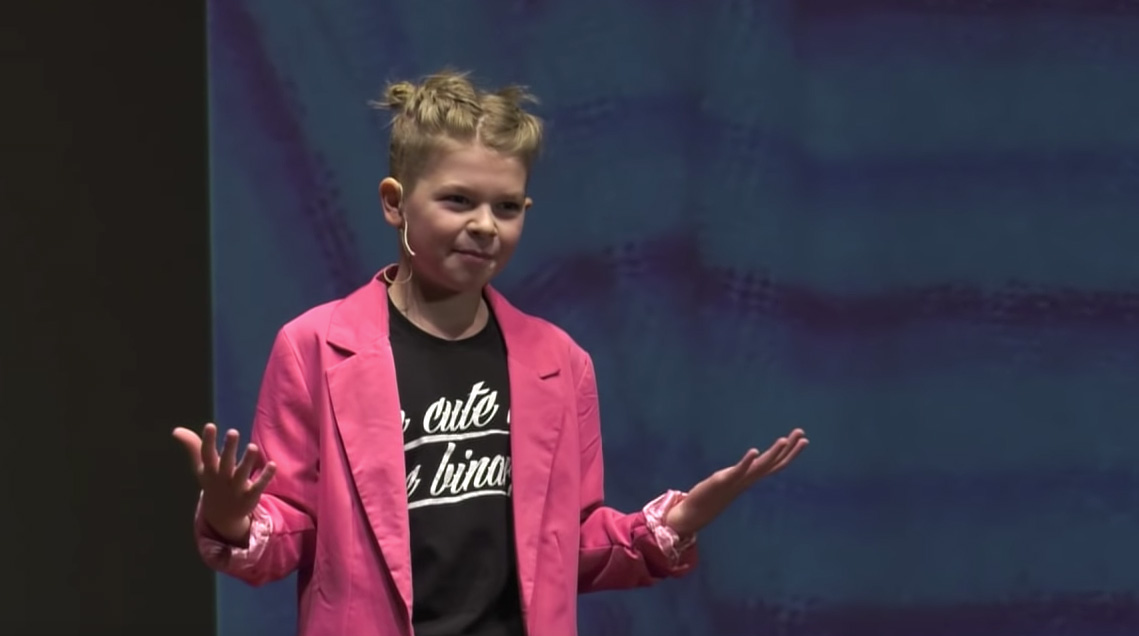More and more people are speaking out against the process of performing medically unnecessary surgeries on babies born with intersex conditions.
One family recently spoke to NBC News about their own experience raising an intersex child. Kristina and Josh Turner found out that their child Ori was intersex when they were six weeks old. A few years ago, Ori came out as non-binary after being assigned female at birth.
Kristina Turner told NBC News:
“They identified Ori as being female and told us we had a happy, healthy baby and we went on our way.”
Later, Ori’s parents were told that they had been born with a condition called partial androgen insensitivity disorder which meant that they were born with both XX chromosomes and XY chromosomes. Additionally, medical professionals were unable to determine whether Ori’s genitalia could be considered biologically male or female. Earlier this Summer, Ori and Kristina outlined their opposition to unnecessary surgeries on intersex babies in their TEDxTalk: ‘Intersex is Awesome’.
Ori’s parents were advised to have cosmetic surgery performed on their child, but as Ori’s condition made no impact on their medical health, they refused.
Kristina said: “We decided not to do these surgeries because when you’re making this decision for someone, even if it was possibly the right decision, they could end up questioning that later, just because that decision was taken from them.”
Kristina said that raising an intersex child was not a challenge, but that the challenge lay in “raising the rest of the world around Ori.”
It is estimated that up to 1.7% of the world’s population is born with genetic, chemical, or anatomical features that fall somewhere between what is typically classified as male or female. Since the 1950’s, doctors have performed “corrective” surgeries on infants with ambiguous genitalia and sex characteristics. These procedures may cause a number of harmful consequences including scarring, chronic pain, urinary incontinence, loss of sexual sensation or function, psychological damage and incorrect gender assignment.
A recent memo leaked from the Trump administration revealed the US president’s plans to define sex as a binary condition determined by chromosomes, as well as a state that cannot be changed. This would have severe consequences for trans and intersex people alike, especially with regards to federal recognition of gender identity. Ultimately, the very existence of intersex people demonstrates that gender and sex are non-binary, undermining Trump’s proposed plans to re-define gender as a “biological, immutable condition determined by genitalia at birth”.
Irish law does not prohibit medically unnecessary surgeries on babies, and intersex people are offered very limited protection under Irish legislation. In a review of the Gender Recognition Act 2015, Moninne Griffith, executive director of BeLonG To, urged increased measures in order to protect intersex people. The review recommended that “all measures taken to improve access to gender recognition, both with regard to age and gender identity, should also provide access for intersex individuals”.
© 2018 GCN (Gay Community News). All rights reserved.
Support GCN
GCN is a free, vital resource for Ireland’s LGBTQ+ community since 1988.
GCN is a trading name of National LGBT Federation CLG, a registered charity - Charity Number: 20034580.
GCN relies on the generous support of the community and allies to sustain the crucial work that we do. Producing GCN is costly, and, in an industry which has been hugely impacted by rising costs, we need your support to help sustain and grow this vital resource.
Supporting GCN for as little as €1.99 per month will help us continue our work as Ireland’s free, independent LGBTQ+ media.


comments. Please sign in to comment.